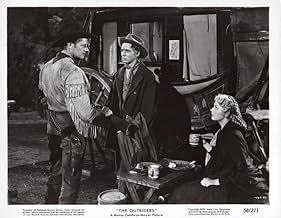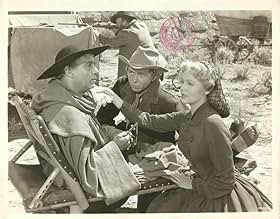Füge eine Handlung in deiner Sprache hinzuIn 1865, three escaped Confederate POWs are coerced into joining an offshoot of Quantrill's raiders who are planning to rob a Union gold shipment concealed in a civilian wagon train going fr... Alles lesenIn 1865, three escaped Confederate POWs are coerced into joining an offshoot of Quantrill's raiders who are planning to rob a Union gold shipment concealed in a civilian wagon train going from Santa Fe to St. Louis.In 1865, three escaped Confederate POWs are coerced into joining an offshoot of Quantrill's raiders who are planning to rob a Union gold shipment concealed in a civilian wagon train going from Santa Fe to St. Louis.
- Farmer's Wife
- (Nicht genannt)
- Outrider
- (Nicht genannt)
- Farmer's Son
- (Nicht genannt)
- Prisoner
- (Nicht genannt)
- Boy Telling About the War
- (Nicht genannt)
- Wagon Driver
- (Nicht genannt)
- Prisoner
- (Nicht genannt)
- Ross
- (Nicht genannt)
- Outrider
- (Nicht genannt)
Empfohlene Bewertungen
The Outriders was a typical late '40s western movie, so the only reason I decided to watch it was that I like Joel McRea. Otherwise I might have passed on this 55 year old sage brush saga. But once it started, the female lead, Arlene Dahl, caught my eye.
Ms. Dahl could have been just another late 1940s blonde, blue eyed movie star in another late 1940s oater except for two things. first, she looked uncannily like my high school sweetheart (I know, everyone has an old high school sweetheart-go watch American Graffiti) but she really did look like her. And secondly, she spoke softly and moved, glided across the stage, just like *** did.
Then the story line somewhat mirrored the relationship we had. A tough and dangerous outlaw meets a sweet, honest and stunning beauty. I let myself slip into the fantasy of this movie figuring it would be a nice bit of nostalgic escapism. but then came the dance scene during the wagon train's stop on its overland journey.
Head honcho Will Owens (McRea) tells Jen Gort (Ms. Dahl) to stay in the wagon to avoid getting the trail hands stirred up, but when the men break out fiddles and guitars and start singing around the camp fire, she comes out, dressed to the nines with her dancing shoes. Jen glides effortlessly across the camera's view and dances with all the men, politely and dignified, yet strikingly alluring and all woman.
But what touched me was when she told Will Owens "you wanted me the most". No modern day tawdriness; nor erotic film scene with naked, sweating bodies could convey the message any clearer than her voice, her eyes and those words. It took me back.
This film may just be another fast paced western to most, but to me it is **** and me. I miss her.
Here to the premise is three men who also go their separate ways as a result of the Civil War. Here the shared experience is prison camp. Joel McCrea, Barry Sullivan, and James Whitmore are Confederate prisoners who escape in early 1865. In effecting their escape they fall into the hands of a rebel guerrilla leader played by Jeff Corey.
Being guerrillas these guys don't play by the rules. The trio either goes west to Santa Fe to act as Judas goats and lead a gold train into ambush or die right there. Even the always honorable Joel McCrea sees he has no options here.
The rest of the story is how the conflicts internal and external are resolved and how the three escaped prisoners decide what course they have to take. Oh, and Joel McCrea meets up with Arlene Dahl and she kind of helps him along in the decision process.
The movies never had a more honorable or stalwart hero than Joel McCrea. And if you've seen any of his films, fans will know that whatever he does it will be the honorable thing. It's a tribute to McCrea that if he insisted on always being the stalwart hero, he had the talent and personality to carry it off.
It's familiar ground for Joel McCrea, but western fans will like the story and the gorgeous technicolor photography that captures it.
The other virtue of the studio system is the stable of professional actors who perform their roles not to steal scenes but in service of the plot. Joel McCrea may excel even Randolph Scott in saying the most with the least words while never ever lying--the Western-hero actors of their generation internalized completely the cowboy as a latter-day knight, and the alchemy of script and star is fascinating. Arlene Dahl may be even more economical with her speech than McCrea. In the central dance scene she speaks not a word until a critical moment, then agrees to dance with McCrea only if he bows to put fresh shoes on her feet. The scene is all about sex, but the actors, the script, the direction, and the genre completely control the sexuality's expression.
In the supporting ranks James Whitmore, not yet 30, is convincing as an old-coot warrior-sidekick with kidney trouble, while Ramon Navarro--a former sex symbol entering his 50s--plays a Mexican padrone who's still got chops. Barry Sullivan and Jeff Corey remain menacing even when they're acting cooperative. Claude Jarman, Jr. is always worth watching but the director or editor seemed to forget he was in the movie.
I couldn't stop watching, but the less-enthusiastic reviewers have a point. The film fulfills its genre so professionally that it never falls below a certain level. But those same qualities make its most beautiful moments somewhat understated, like something even better might once have been imagined but for now they need to finish a movie.
Wusstest du schon
- PatzerWhen Will puts Jen's shoes on her, she is wearing sheer stockings. In the 19th Century, since hemlines were ground level, and ankles could not be seen, sheer stockings would have been pointless. Silk and rayon stockings only came about in the 1920's (and nylon in the 1940's) when hemlines rose and showed off a woman's ankles and calves. In the 1860, women's stockings would have been either wool or cotton, and what Jen is wearing when Will puts her shoes on her feet are sheer and NOT wool or cotton.
- Zitate
Clint Priest: Me, I kinda relish gettin' old... takes the bother out of livin'.
- VerbindungenReferenced in Brustbild bitte! (1950)
Top-Auswahl
- How long is The Outriders?Powered by Alexa
Details
Box Office
- Budget
- 1.621.000 $ (geschätzt)
- Laufzeit
- 1 Std. 33 Min.(93 min)
- Seitenverhältnis
- 1.37 : 1





































